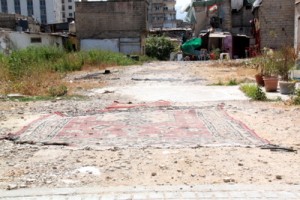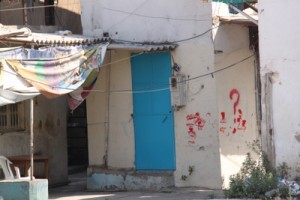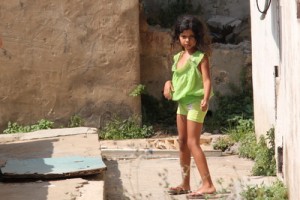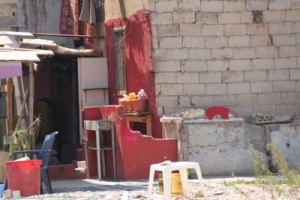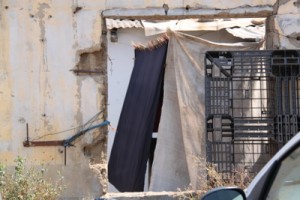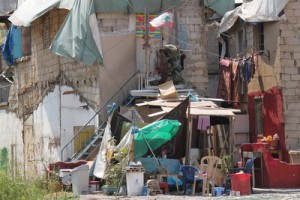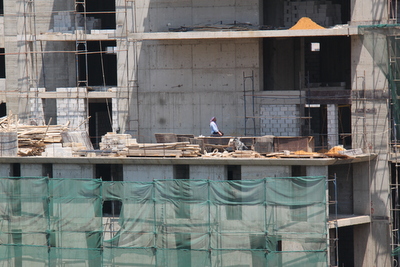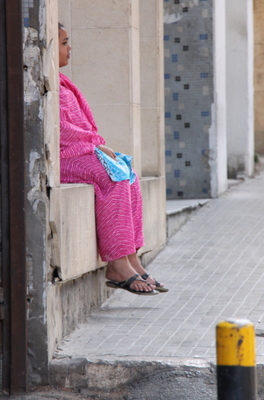I found in my letterbox this week an advert for a language institute, with upbeat promises of imminent proficiency and the slogan A hablar se aprende hablando! Granted, but there’s a very British obstacle to learning to speak by speaking which was particularly evident during my course.
This is my third year of the Casa de Cultura course. Although there are – officially – four levels, students of any level are free to join the class at any point over the year. Despite the lack of structure and the fact that it’s only three hours a week, it has actually been an invaluable course which got me through the DELE exams (B1 and B2), along with websites like studyspanish.com and my trusty exam guide El Cronómetro.
Apart from it being cheap and very close to my home, two major pull factors for me, the other big selling point is that all nationalities are mixed together so the course is entirely in Spanish. Spanish taught through Spanish, not through your native tongue.

Murderous identities, or, In the Name of Identity
I noticed, however, in the lower levels where there are many Brits, lots of them group together and chat through class in English or murmur the English translation to each other at the first hesitation. They are choosing to learn through English. They would rather a quick translation than a Spanish explanation of a word, learning through context.
They also spend a lot of time insisting on how rubbish they are, in fact each one is adamant that they are more rubbish than the other. It’s all very self-deprecating, which breeds good feeling. Speaking well, you fear, would have the opposite effect, generating suspicion, mistrust. Someone who can pull it off, instead of inspiring admiration, would have broken ranks. In fact, in the face of class participation, the atmosphere is very much what it was when I was 14 and sitting in French class with Mrs Prowse. When called upon to talk, surrounded by their compatriots, the British say a few words in Spanish and then tail off in English. The teacher repeats what they were trying to say in Spanish, and they answer, “Yep, that’s what I meant”. Needless to say, the Finns in the class don’t talk to the teacher in Finnish, nor the Russians in Russian.
The embarrassment of attempting to speak or even passively learn a foreign language while among one’s compatriots is fearfully strong. Students seem both intimidated and discouraged by their self-applied label of “Rubbish at Languages.” Yet something in us fights against openly trying to improve. Somehow our skin crawls at the mere idea of pretending to talk Spanish, because after all it does feel like a pretence. Pretending to be foreign. Putting on an accent. Putting ourselves out there. Like trying to do improv in a crowded metro. Except this is a language course, attended by people who have all paid to learn a language.
The ubiquitousness of English has become a shield for these British who get out of bed for a class twice a week but revert to their own language as soon as possible. Not because of laziness but because of embarrassment.
Why is that? Are we just afraid of getting it wrong? If so it would apply to all subjects. I don’t know any other topic where the students go to learn but seem bent on failing. Is it altogether too earnest for us Brits (cf “earnestness” in Katie Fox’s Watching the English)? Do we fear we look like we are trying to be clever, to be posh, to …heaven forbid… better ourselves?
Although I have always liked languages, I do know this fear. I can’t separate it clearly from other forms of self-consciousness that clutter the landscape. But I remember when I threw it off for French, when I was 15 and visited my sister in France. I spent a lot of time on my own visiting Paris and somehow the walls dropped. French wasn’t “foreign” in Paris, it was natural, necessary. I didn’t think I would suffer from it again, not in a serious ability-cramping way, but I did. When I lived in Beirut and had made local friends using English, I found it really hard to begin using my very limited but improving Arabic in conversations. I felt like it meant saying Look at me! I’m speaking Arabic! I also wanted to have proper conversations, not ones that were dumbed down to my language level – that is, small talk! But I could have mixed languages. I should have mixed. After all, the real Lebanese always do.

Lebanese pastries
I’m still angry at myself for living in Beirut for nearly four years and not coming away fluent. The upside is that this regret goads me on in Spanish. I refuse to leave Spain without learning the language. I refuse to be prevented from learning by the fact that I don’t know everything. And the words of Amin Maalouf ring true: ‘Linguistic diversity is the pivot of all diversity.’ If you can learn a man’s language, you can walk in his shoes.

The less sweet side of Beirut
To my relief, I found that in the class for the higher language levels, this gregarious linguistic suicide doesn’t happen. People are openly - dare I say earnestly – trying to learn. Even those with a sense of humour. I wonder why. Is it just chance that there are too few Brits in the higher classes to trigger any kind of herd behaviour? Is it because those who are too crippled by the embarrassment just can’t progress any further? Does their self-assigned failure become a self-fulfilling prophecy? Do socially “normal” Brits keep themselves back to be socially acceptable? Is moving forward uncomeradely, disloyal? The British are the biggest foreign community in this town, yet in my class they are decidedly underrepresented. There are three Finns, two Russians, two Ukrainians, a Persian, two Italians, a Dane, a Belgian, a Bulgarian, a Chinese and a Moroccan.
I’m the lone Brit. With no-one to whisper the answers to me. No one to murmur jokes to. No one to make me embarrassed about trying to talk “foreign”.






